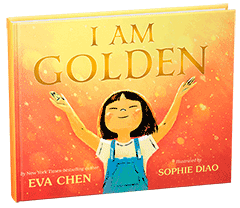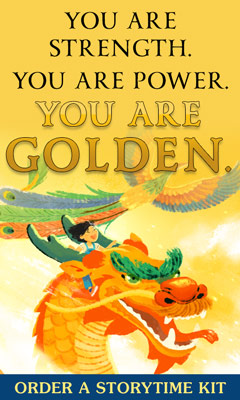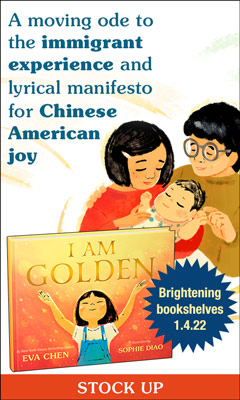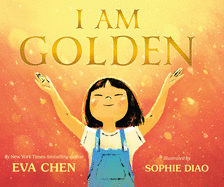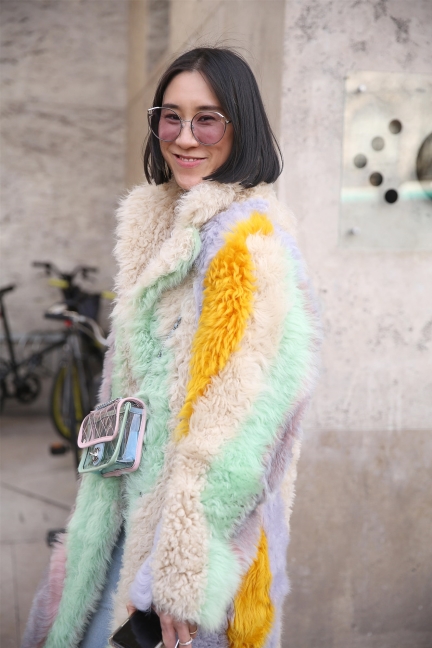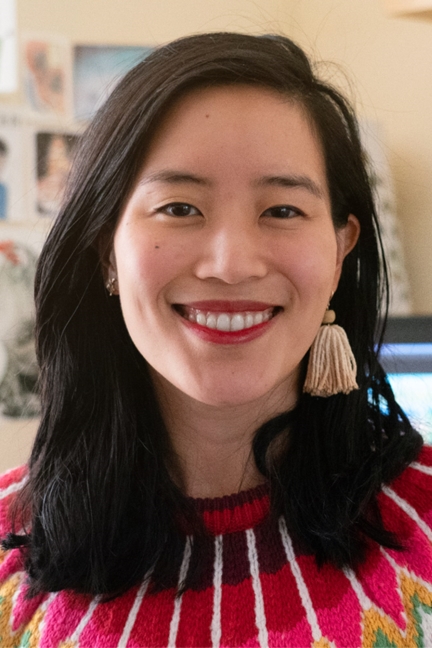I Am Golden
by Eva Chen, illus. by Sophie Diao
An Instagram executive and Google Doodler might not seem to be a literary match, but author Eva Chen (Juno Valentine series) and illustrator Sophie Diao (I Am the Wind) prove to be an ideal pairing in their fabulous first picture book collaboration, I Am Golden. "We named you Mei," adoring parents explain to the infant in their arms, "Not May like the month. Měi, which means beautiful. Like the country we live in now--Měi Guó, America." A narrative immediately emerges through perfectly matched text and illustration: immigrant parents whose native language is not English but Chinese, whose hopes for a new life in a new country are embodied in the very name of their U.S.-born child. Every gorgeous spread in Chen and Diao's co-creation maintains this exceptional and precise text and art symbiosis.
To her parents, growing Mei is wondrous, with "eyes that point toward the sun... hair as inky black and smooth as a peaceful night sky... skin brushed with gold." While she might sound almost like a fairy-tale apparition, Diao's illustrations make sure the youngest readers immediately recognize Mei as simply another little girl in her blue bib overalls, sitting patiently (enough) while her floral-aproned mother prepares to cut her hair. To showcase "the hopes and dreams of [her] ancestors" that Mei's parents imbue in their maturing child, Diao presents a tabletop of family photographs. The pictures feature multiple generations and time periods, some are black and white, some have faded with age, some suggest new beginnings. The brightest photo is a visit to the iconic White House during summer vacation, the corner digitally stamped "08 21." (Diao nimbly reveals most of the actual sourced photos in the backmatter.)
Mei becomes "teacher and translator" for her parents, as an English-speaking, culturally adapted conduit who can bridge the daunting "unknown." Diao places the family in the middle of an explosive city scene, not unlike Manhattan's Times Square. Mei buzzes with energy, an arm raised, a foot about to launch her upward, but she's a sharp contrast to her parents who appear worried. Diao cleverly turns the family tableau upside down--literally--by adding a reflective scene that at first glance might seem like a mirror image caught in a puddle. Look closer, though, because Diao shows that beneath the appearance of troubled concern are two parents proud of their daughter's ease and confidence. Outside of the protection of family looms loneliness, ostracism and racism. But "there is power in being different," Mei's parents remind her, "You are made of dragons, of phoenixes, of jade rabbits, and of monkey kings," the many symbols of her ancestral heritage. In Diao's interpretation, a delighted Mei flies through a golden sky on the back of a dragon, a phoenix soaring alongside.
Chen astutely points out the ironic perils of being othered: "It's a strange world we live in--people will call you different with one breath and then say that we all look the same with the next angry breath." And yet, Mei lays claim to a collective Asian American history filled with Chinese American pioneers who have paved their own golden paths. Diao illustrates images of Michelle Kwan, Maya Lin, Jeremy Lin, David Henry Hwang (as a nod to his subversive play, M. Butterfly) across a double-page spread, even including a meta-wink adaptation of her own Google Doodle (January 22, 2020) honoring the 97th anniversary of Anna May Wong's first leading role.
Of course, no celebration would be complete without food, as family near and far "gather to hope, to dream, and to sing your praises, Mei." Eager hands reach for "plate upon plate of delectable deliciousness" to nourish their bellies as "all our stories" nourish their hearts. Amid Mei's memorable milestones, Chen gently reminds readers of the necessity "to pay tribute to those we've loved and lost along the way as oceans and worlds and cultures separated us."
In her author's note, Chen describes how I Am Golden came from a declaration of joyful empowerment: "as a love letter to my parents, to their dedication, strength, and commitment to their family." Yet the initial impetus began in frustration and fear, during the Covid-19 pandemic and a "meteoric rise in anti-Asian sentiment." Chen actively, anxiously warned her own parents, "telling them to wear sunglasses (and hats... and scarves) so that people wouldn't see that they were Asian." But even in her alarmed caution, what Chen recognized was her parents' courage, their sacrifice. "Countless other immigrants" have made the same sacrifice for their children, which is "the seed" of the idea for this book. Her text is both homage and celebration, her sentences crisp and accessible, populated with validating verbs--"we see," "we know," "you are"--and affirming actions--"unfurling," "unapologetic."
Author and artist fervently hope their readers will take to heart the titular affirmation. In cultures around the world, gold is the ultimate standard--valuable jewelry, winning medals. But for immigrants specifically, the United States was where the streets were paved with gold, where opportunities waited on Gold Mountain, a sobriquet especially used by peripatetic Asian Americans. Chen and Diao weave the inherent value of the child throughout, aiming to encourage Asian American children to claim, "I am golden." --Terry Hong



